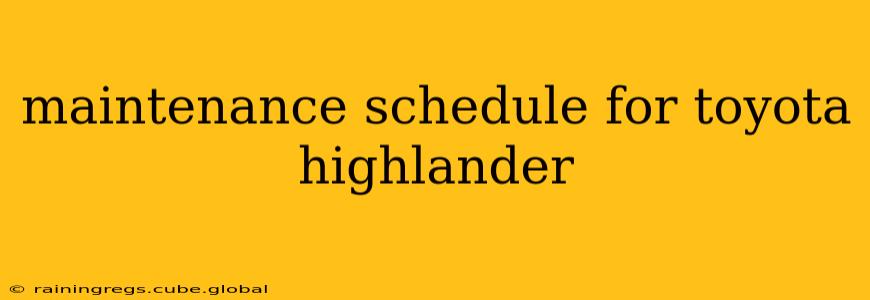The Toyota Highlander, known for its reliability and spaciousness, requires regular maintenance to keep it running smoothly for years to come. This guide outlines a comprehensive maintenance schedule, encompassing routine checks and recommended services. Remember to always consult your owner's manual for the most accurate and up-to-date information specific to your Highlander's year and model. This schedule provides a general overview and may vary slightly.
What is Included in a Typical Toyota Highlander Maintenance Schedule?
A typical Highlander maintenance schedule incorporates several key components:
- Fluid Changes: This includes engine oil, transmission fluid, coolant, brake fluid, and power steering fluid. The frequency of these changes depends on driving conditions and mileage, but generally, they fall within specific mileage intervals outlined in your owner's manual.
- Filter Replacements: Air filters, cabin air filters, and fuel filters are crucial for optimal engine performance and clean air inside the vehicle. Regular replacement ensures efficient operation and prevents potential problems.
- Tire Rotations and Inspections: Proper tire rotation and regular inspections maintain even tire wear and extend their lifespan. Check your tire pressure regularly as well.
- Brake Inspections: Regular brake inspections are vital for safety. This includes checking brake pad thickness, rotor condition, and brake fluid levels.
- Battery Checks: Battery health is essential for reliable starting. Regular checks ensure the battery is adequately charged and in good condition.
- Belt and Hose Inspections: These components are vital for engine operation and should be inspected for wear and tear.
- Component Inspections: Various other components, such as suspension parts, steering components, and lights, should also be inspected regularly.
Toyota Highlander Maintenance Schedule by Mileage
This is a general guideline; always refer to your owner's manual for precise intervals.
Within the first 1,000 miles: First oil and filter change is usually recommended to remove any metal shavings from the engine break-in period.
Every 5,000-7,500 miles (or every 6 months): Oil and filter change, tire rotation, visual inspection of belts, hoses, fluids, and lights.
Every 10,000-15,000 miles (or every 12 months): Check and replace air filter, cabin air filter. Consider a fuel filter change depending on your driving conditions and fuel quality. Comprehensive inspection of brakes, tires, and other components.
Every 25,000-30,000 miles: Transmission fluid service (check your owner's manual for specific recommendations, as some Highlanders may require less frequent changes).
Every 50,000-60,000 miles: Spark plug replacement, coolant flush, possibly power steering fluid and brake fluid flush depending on usage.
Every 100,000 miles: Consider a more extensive inspection, potentially including timing belt replacement (if applicable to your model year).
What Fluids Does a Toyota Highlander Need?
Your Toyota Highlander requires several essential fluids:
- Engine Oil: Essential for lubrication and engine protection. Use the recommended oil weight and type specified in your owner's manual.
- Transmission Fluid: Lubricates and cools the transmission. The type of fluid depends on your transmission type (automatic or manual).
- Coolant: Prevents overheating and maintains optimal engine temperature. Use a 50/50 mix of coolant and distilled water, as recommended by Toyota.
- Brake Fluid: Transmits pressure from the brake pedal to the brakes. It should be inspected and flushed periodically.
- Power Steering Fluid: Lubricates the power steering system.
How Often Should I Rotate My Toyota Highlander's Tires?
Tire rotation is typically recommended every 5,000-7,500 miles, or every 6 months, whichever comes first. This helps ensure even wear across all four tires and extends their lifespan. Consult your owner's manual for the recommended rotation pattern for your specific Highlander model.
What are the Common Maintenance Issues for a Toyota Highlander?
While the Highlander is generally reliable, some common maintenance issues might include:
- Oil Leaks: Regular oil changes and inspections can help prevent or detect leaks early.
- Brake Pad Wear: Regular brake inspections are crucial for safety.
- Transmission Problems: Regular transmission fluid changes are vital for longevity.
- Electrical Issues: Regular inspections can help identify and address potential electrical problems.
By following a consistent maintenance schedule and addressing any issues promptly, you can ensure your Toyota Highlander remains reliable and enjoyable for many years to come. Remember, this is a general guideline; always consult your owner's manual for model-specific recommendations.
